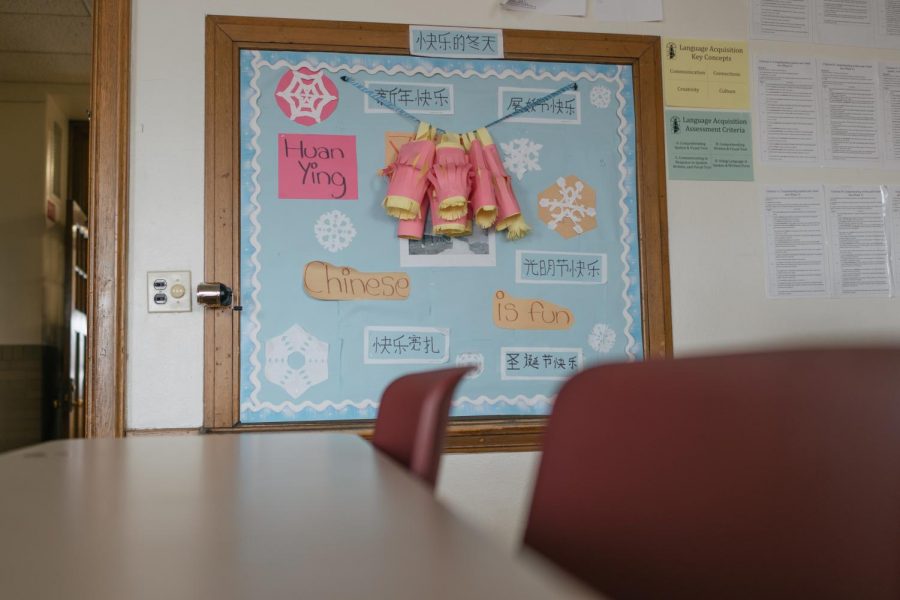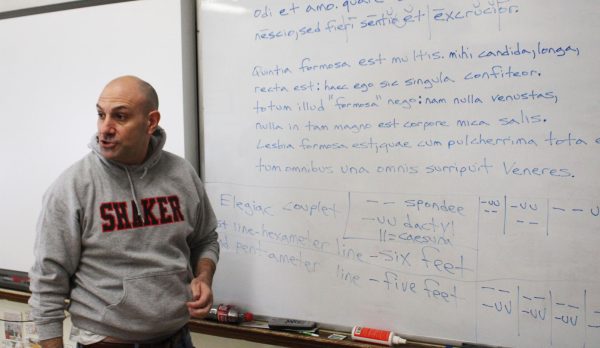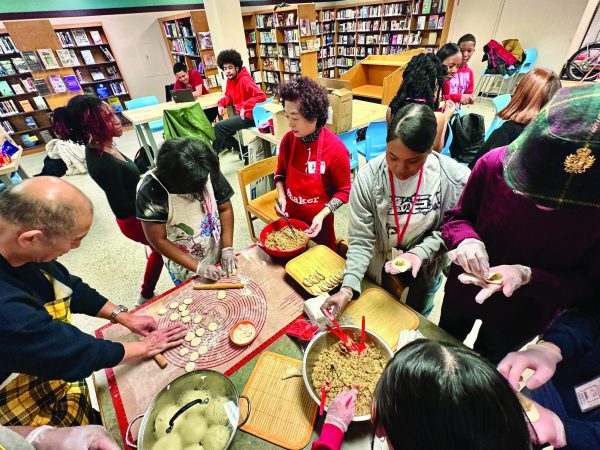Student Views at The Outset of Mandarin Instruction
Woodbury Elementary School and high school students weighed in on the district’s Mandarin initiative
“Chinese is fun,” says the bulletin board in the Chinese classroom in the high school.
Eight years after establishing Mandarin Chinese instruction for first through fifth graders, the district will switch to Spanish instruction from first to fourth grade, with fifth grade instruction yet to be determined. In a Jan. 31 email announcement, Dr. David Glasner, superintendent, and Dr. Marla Robinson, chief academic officer, stated that Spanish instruction will begin in elementary schools at the beginning of the 2020-2021 school year.
The reasons Glasner and Robinson cited for the change echo criticisms of the program that The Shakerite documented in March 2012 in its inaugural Investigations effort. The related stories were reported primarily by the Journalism II students Shane McKeon (’14), Marcia Brown (’15) and Taylor Butze (’15). The investigation was prompted by a Woodbury student, who wrote a letter critical of the district’s approach, gathered 80 signatures from peers and sent it to Dr. Randy Yates, former Woodbury principal, now retired. The Shakerite also published the letter.
Below, the letter and editorial responses to the investigation have been compiled to simplify reader access.
Hilary Shakelton, Web Managing Editor
Letter to Woodbury Principal Yates
Dear Dr. Yates,
I would like to express my feelings about having Chinese once a week instead of Social Studies. I’m concerned that this extra Chinese class is a bad way to spend our time.
As a principal, you must know that our class time is limited. We only have a few hours in the day, and it’s hard to get everything done. But it may not be the best use of our time to have Chinese instead of Social Studies.
I’d first like to say that Social Studies is a very important subject. The lessons are very well thought out, and we learn so much. Our teachers have all their lessons planned out and know exactly what we need to learn. There’s a very good curriculum, and the classes are interesting and the classes are interesting and well thought out.
It’s a different story with Chinese. I understand why you want us to have another Chinese class. It’s impossible to learn a language if you only use it once every other week. But I don’t think this extra class will do us any good, for there are a few glitches in the way Chinese is run at Shaker, and Woodbury in particular.
We don’t learn. Watching You Tube videos, doing crafts, and playing Chinese games on the computer isn’t going to help us speak Chinese. You might pick up a few words here and there, but no one actually knows what they mean. This is a big problem if you want to teach children how to speak a language. Also, even if we knew what the words meant, it probably wouldn’t help us to know how to sing ‘My thankful heart’. We want to learn how to speak Chinese, not sing songs!
This is another big difference between Chinese and Social Studies. In Social Studies, we learn many useful things, like what the 50 states are, what the 13 colonies were, and where the Rocky and Appalachian mountains are. These are things we could really use during our lifetime, whereas when are we ever going to sign a song about colorful lanterns?
Another thing is that Chinese lessons aren’t planned very well, whereas Social Studies lessons are. In Chinese, normally half the class falls asleep. In Social Studies, everyone is alert and ready to learn. In Chinese, we aren’t learning anything that may one day help us be bilingual. In Social Studies, we’re learning things that will educate us in the history of our country and what’s going on in our world.
I’d like to point out a few other things about Chinese. Firstly, I’ve heard that China pays for us to learn Chinese. Is this true? If so, they should know that, instead of making kids want to learn Chinese and giving them a good foundation, they’ve turned mostly everybody against the language. Is that really what they’re paying us for? Because everybody’s going to quit Chinese once they reach middle school if the lessons keep up like this.
So because of the points, I don’t believe this extra Chinese class is going to help us learn Chinese, because the curriculum isn’t very good. We should be having Social Studies instead, because this is a class with a good curriculum and everyone can learn.
You may be wondering if everyone feels this way about Chinese. They do. I’ve even had a few kids sign my letter to prove it.
I’ll now give you my final thoughts on Chinese and Social Studies.
First off, Social Studies is a good subject that we should have every day. We shouldn’t be deprived of this great class for Chinese. Think about it.
Secondly, my thoughts about Chinese. I think we should either stop it, or change a few things about how it is run. Chinese should A) be interesting enough for the students to get involved, B) have a steady curriculum and planned classes so that we keep learning new and important things, C) have confident teachers, preferably with experience running the class, and D) have some way to make sure that we’re learning useful things. Because really, how much do we need Chinese? Is it really important enough for you to waste and hour of Social Studies?
Please think about the complaints and concerns of the students of Woodbury Elementary. Because really, Social Studies is much more important than Chinese, especially the way Chinese is currently run. And do try to make some changes in the way Chinese is run, or stop it entirely.
Thank-you for considering our concerns. As the principal, we thought you would like to know our opinion.
80 Woodbury students signed this letter before it was presented to Woodbury Elementary School Principal Randall Yates. They were removed to protect the privacy of the students who signed.
Students Support Chinese in Shaker
Jonah Weinstein, Emmett Hammer, Matt Krantz, Thomas Greenhalgh-Miller April 12, 2012
In last month’s edition of The Shakerite, an anonymous 6th grader was quoted saying “Chinese is weird.” As fourth year Chinese students at the high school, we can verify this sentiment. Chinese is fascinating, challenging and rewarding – from Dim Sum at a Chinese restaurant to the Cleveland Asian Festival, Chinese people are very impressed when Shaker students are even able to offer a simple, “Ni Hao” (hello). Nevertheless, Chinese is above all weird.
Sixth graders complain of superfluous cultural activities and arts and crafts. Meeting only twice a month, they are unable to progress significantly in Chinese fluency. However, unlike the sixth graders, high school Chinese students meet daily. We are able to see the bigger picture, look past that “Chinese is weird,” and embrace China’s rich language, culture and history.
Although “Chinese is weird,” we should not avoid the subject. The whole point of education is to familiarize oneself with the unknown. Math, science and the arts all feature abstract and often weird ideas but remain an important part of our education. It is easy to dismiss Chinese as “weird” and less important than social studies. Yet Chinese is one of the most important subjects being taught in schools today. Knowing the 50 states may be useful, but learning Chinese opens the door to unparalleled opportunities and a global perspective.
First-year Chinese students spend the bulk of their time accustoming themselves with the Chinese language (pronunciation and tonality). Although the elementary Chinese classes do not meet nearly enough to learn very much Chinese, by the time they get to high school, they will be well prepared. By “singing songs about colorful lanterns,” the students are learning to recognize and pronounce Chinese, thus building an appreciation for the language.
Dr. Freeman suggests greater exposure will benefit the sixth graders. With only two classes a month, it is hard for elementary school students to do more than sing Chinese songs or watch YouTube videos. Chinese is a language that is acquired through daily practice and participation; without regular Chinese classes, there can be no regular curriculum or assessment. Nevertheless, Ohio Foreign Language Association (OFLA) and the National Chinese Language Conference (NCLC) acknowledge Shaker for its progressive Chinese program.
High school students—who study Chinese daily—enjoy celebrating the Mid-Autumn Festival and learning about Chinese culture, both in the classroom and after school in Chinese Culture Club. Although, we are still far from fluent, as Chinese IV students, our Chinese education has been enriched by cultural experiences. Having the ability to intonate “Happy New Year” in Chinese has already begun to build bridges and expand our horizons a primary reason for learning any language.
Shaker has given students many opportunities to visit China. On the band, Asian Studies, Chinese Bridge Program and upcoming choir and orchestra trips, Shaker students have impressed China with their talents and charisma. Travel to Beijing for a few weeks and it becomes incredibly apparent that China is becoming a global power, and understanding its language and culture is more vital today than ever before.
Chinese Curriculum Coordinator Ms. Li Luling (who was never contacted for an interview in last month’s Shakerite), simply smiles and says, “Chinese is not hard, otherwise, there would not be 1.3 billion people speaking it for 5,000 years, so it is definitely valuable to learn this language.”
Cover Story Responds to Students’ Submission
Alysse Eberhard, Marissa Miller, Rachel Shaw, Cover Stroy Editors April 12, 2012
After reading the entire letter that Woodbury students signed and presented to Principal Randall Yates (to read the full letter, see www.shakerite.com), it was apparent that Woodbury students feel they are being subject to an ineffective Chinese curriculum, and that social studies classes were being sacrificed without cause. In writing the article, “The Challenges of Learning Chinese,” we meant only to convey that the Woodbury Chinese program, as it is now, is inadequate. We are not questioning the efficacy of the techniques used to teach Chinese, but rather their applicability when Chinese classes are only twice a month. Furthermore, the district is currently partially financing eight Chinese teachers in the lower schools and will shoulder their full salaries beginning next year, prompting the question, “Is it worth it?”
We largely agree with the authors of the above letter. We feel as though Woodbury students require “all or nothing” when learning Chinese – either a much more comprehensive study of the language, or to eliminate Chinese as it is being taught now from the curriculum. The authors clearly advocate for a much stronger Chinese program at the lower schools, and present a convincing argument.
Lastly, we intentionally did not address the high school Chinese curriculum. We did not intend to negate the positive effects of the Chinese program, but rather to focus on the situation at Woodbury.









